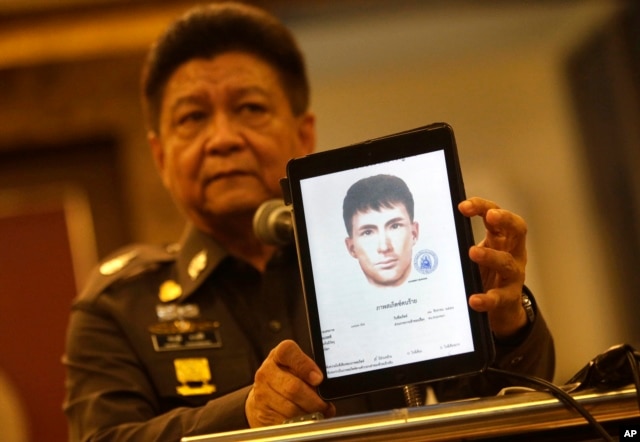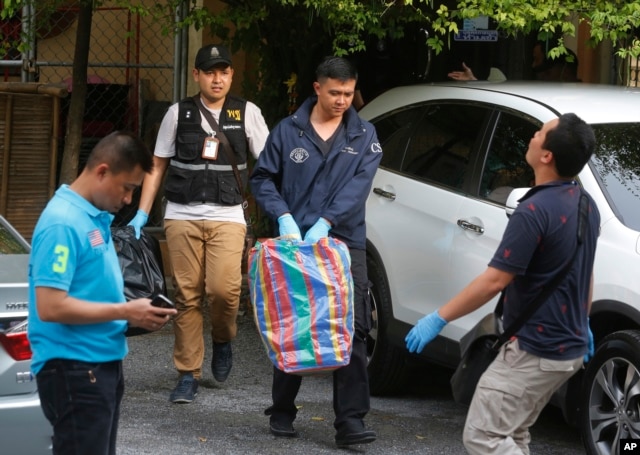
Thai Police: Suspect Fingerprints Matched to Raided Apartment
VOA reporter Steve Herman
BANGKOK—Thailand’s military junta and police are speaking of “significant progress” in their investigation of last month’s bombing of a Bangkok shrine, which left 20 people dead and wounded more than 120 others, many of them Asian visitors.
The authorities are talking about a foreign man arrested at Thailand’s border with Cambodia.
“The results from fingerprint analysis confirmed that his fingerprints were on the bottle that contained explosives” found inside an apartment raided last Saturday, said national police Lt. General Prawut Thavornsiri. “We confirmed that he is involved and might be the person who brought the bomb out of the room or brought it to the area” of the Erawan Shrine on August 17.
Police spokesman Lt. Gen. Prawuth Thavornsiri shows a photo of one of three men Thai authorities have issued new arrest warrants for in connection with the bombing case, in Bangkok, Thailand, Sept. 1, 2015.
The top police spokesman made the announcement on a broadcast by Thailand’s military junta aired at noon Wednesday on all channels.
On the same broadcast, junta spokespersons — speaking in Thai, English and Mandarin Chinese — announced that authorities must be notified by hosts of all foreign guests within 24 hours of their arrival.
The notice applies to “homeowners and owners of hotels, apartments and accommodation buildings where there are foreigners staying,” according to the broadcast.
Arrest warrants have been issued for eight people since the August 17 blast, including at least four men who are believed to be Turkish.
The military junta running the kingdom since a coup last year has ordered officials not to refer to the bombing as an act of international terrorism or mention possible links to Turkey or China.
There has been speculation that the attack could be a response to Thailand’s deportation in July of more than 100 ethnic Uighurs to China. Western governments and Uighur rights groups criticized the move, saying those deported could face ill treatment back in China.
Following their deportation, violent protests in Istanbul targeted the Thai and Chinese missions.
Thai authorities still have not released the names or the nationalities of the two foreign men they have been interrogating in connection with the bombing of a popular Hindu shrine in Bangkok, the worst single mass casualty attack in Thailand.
The second suspect, according to authorities, was captured by a joint task force of immigration police and soldiers. He is the man whose fingerprints are allegedly on the explosives bottle found in a raided apartment.
Police have not confirmed the authenticity of a Chinese passport reportedly found in his possession issued to Yusufu Mieraili, 25, born in Xinjiang, China.
On Saturday and Sunday, police and soldiers raided two apartment buildings in different areas of Bangkok retrieving what they described as bomb-making materials including urea, gunpowder, electric charges, watches, radio controls, ball bearings and pipes.
Thai policemen take evidence at an apartment on the outskirts of Bangkok on Saturday, Aug. 29, 2015.
At the initial location, where a stack of fake Turkish passports was also found, a 28-year-old “foreign man” was taken in custody.
Authorities have not announced what role they believe he played in the detonation at the Erawan Shrine on August 17 and a blast in the Chao Praya river, adjacent to the Sathorn Pier the following day.
The explosion at the pier caused no injuries.
Thai authorities have repeatedly denied to VOA and others that Chinese tourists may have been the primary targets of the explosions.
Meanwhile, several key figures in Thailand’s military junta left Bangkok today for Beijing.
Defense minister Prawit Wongsuwan, who is an army general and deputy prime minister, is accompanied by army chief and deputy defense minister, General Udomdej Sitabutr. Also on the trip are top national security council officials.
General Prawit told reporters he is to meet Chinese prime minister Xi Jinping and other Chinese military leaders to discuss “security and economic cooperation.”



